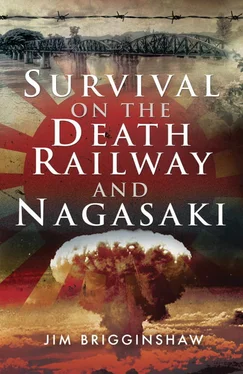Men of various nationalities were in the camp, all anxious to get home as quickly as possible and prepared to grab any opportunity to do so. Finding enough transport was a headache for officers given the job of sorting out destinations to so many countries. It was delaying repatriation, and the men were impatient.
A group of British soldiers, wandering around the airfield trying to cadge a ride home, came across an American pilot who asked them where home was.
‘Wales’, they told him.
‘How lucky can you guys be?’ the American said. ‘That’s where I’m heading. Hop aboard.’
When the plane landed, however, the Brits found themselves in New South Wales, further away from home than ever.
The health of the ex-prisoners who were still in Manila had improved to the point where, their craving for food now appeased, their thoughts turned to matters other than nutrition. A crowd of them visited a tawdry dance hall in the city, and it wasn’t long before a big Aussie had a cooperative Filipino girl perched on his knee as he drank beer from a jug.
A local male resented this. ‘We know Australians’, he said. ‘You no good, you surrender to the Japanese.’
It was like a red rag to a bull. The girl was dumped onto the floor and, almost before she landed, a big Aussie fist had splattered the Filipino’s nose.
Some locals attacked the Australian, and his mates retaliated. In seconds, the place had erupted into a wild brawl involving dozens of men. They were going punch for punch when a Filipino produced an army revolver and started shooting.
The police arrived and, brandishing their own guns and large batons, waded into the melee and restored peace, but not before considerable damage had been inflicted on both the establishment and the faces of the combatants.
Fortunately, nobody was killed by the flying bullets. The worst injury was to a dance hall girl, who had a toe shot off.
Each day at the Manila camp, the repatriated prisoners were given a paper chit that entitled them to chocolate, biscuits, tobacco, cigarettes, cigars, soft drinks and three cans of beer from the American canteen. The beer was very popular.
When word came through that the Australians’ departure for home was imminent, plans were made for a fitting farewell party. However, three cans per man per day wouldn’t be enough for a proper celebration.
Bodero solved the problem of building up a supply. He obtained paper and a typewriter from the Australian orderly room, telling them he had a lot of letters to write home. He copied the typing on the original chits, and the counterfeits proved to be reasonable facsimiles of the real thing. The only thing needed now was an officer’s signature, so Bodero added an unrecognisable flourish. By signing them himself, he might be a counterfeiter, but at least he couldn’t be accused of being a forger.
The fake chits were duly handed out, and the stream of Australians at the American canteen was now endless. The sudden drain on beer supplies must have made it obvious to the Americans that the Aussies were up to something, but if they were suspicious, they said nothing.
By nightfall, one tent alone held forty dozen cans of beer. The mountain of empty cans outside the Australian tents the next morning was proof that the final night in Manila had been a happy going-away party. However, it also meant that it was a sick and sorry lot who boarded the American Liberty ships that ferried them out to the British aircraft carrier HMS Indomitable . The carrier was anchored five miles out to sea because the harbour was littered with so many sunken vessels that a ship of its size couldn’t get anywhere near the wharves.
The Liberty ships reached the Indomitable in rising seas, and the American captains circled the carrier, unsure about coming alongside.
Their caution upset the British commander of the aircraft carrier, who stood on the bridge, megaphone in hand, cursing the Americans for their lack of seamanship.
‘Call yourselves sailors’, he roared. ‘If you can’t bring those tubs of yours alongside, drop anchor and I’ll bring my ship alongside yours.’
The embarrassed Americans declined his offer. Instead, they turned around and took the repatriates back to Manila.
The men, disappointed at the further delay to their repatriation, spent that night beerless in the same tents they had left that morning in the expectation that they would now be on their way back to Australia.
The British carrier’s commander hadn’t finished with the Americans. He came ashore and let them know in no uncertain terms what he thought of their seamanship, and then delivered an ultimatum: if they didn’t have the repatriates aboard his ship the next day, he’d let the whole world know about it. He only had a few days to get to Australia, he said, and he was going to deliver the men there on time. If he wasn’t able to do that because of their lousy seamanship, heads would roll.
The next day, the Liberty ships delivered the repatriates out to the Indomitable and although the seas were just as rough, they managed to get close enough for the men to judge the right moment to grab the rope ladder and clamber up.
It was a dicey transfer, but finally everyone was on board.
The Indomitable weighed anchor, and took off at high speed.
At long last, the men were on their way home to Australia.
CHAPTER FOURTEEN
HOMEWARD BOUND
THE Carrier’s quarters were like a first-class hotel to men who’d almost forgotten there were such luxuries as bedsheets, comfortable bunks, hot showers, proper toilets and unlimited room to move about.
They didn’t have fond recollections of ships. They remembered how the Japanese had packed them in like sardines in the torturous holds of the Toyahashi Maru and Awa Maru .
Compared with that, this was heaven.
The carrier’s commander went to great lengths to make more space for them. He had the aircraft moved from the flight deck and set the area aside for recreation and exercise. Netting was erected around the deck so the men could play cricket. If getting home hadn’t been so important to them, nobody would have cared how long the voyage took.
Despite the comforts, men were still dying. They had brought the thiamine-deficiency disease beriberi from the prisoner-of-war camps. Common in the East but unknown in Australia, beriberi was unfamiliar to the young medical personnel brought from Australia to care for the sick and suffering. They weren’t aware that unless the build-up of fluids can be eliminated, the lungs fill and the patient suffocates, an experience similar to drowning. On the carrier, whenever the sufferers craved water, it was given to them. The water built up the fluid in their bodies and they eventually died, killed by kindness.
It was a tragic end for repatriates on their way home after suffering so much.
These deaths were in stark contrast to the way the victims of other tropical diseases were getting stronger and healthier every day through continued good food and relaxation.
Even men prone to seasickness were having a pleasant voyage. The Indomitable was sufficiently large for the heavy seas to produce little roll, and they were able to join in the amusement and entertainment. The carrier commander even arranged for films to be projected onto a large screen hanging from the ship’s bridge on the flight deck.
The hours and days slipped by.
The sea and its fresh, clean breezes were so different from the foul air and dark interior of a Japanese coalmine, and the food and relaxation was a joy after so much starvation and slavery.
The men spent hours watching dolphins playing in the bow wave of the huge carrier, and picked up flying fish from the lower decks as the ship ploughed through their shoals.
Читать дальше












